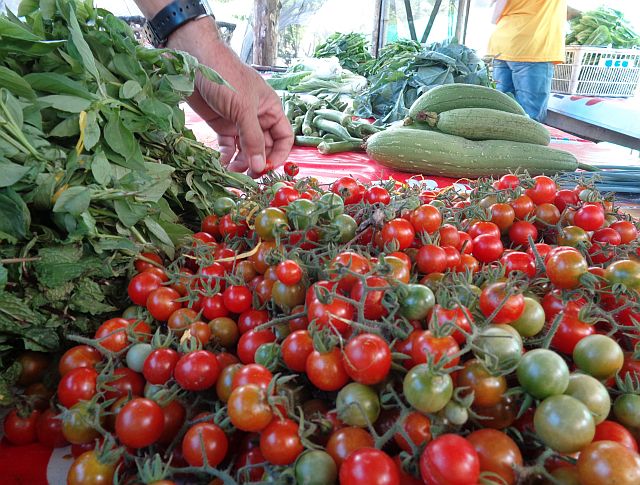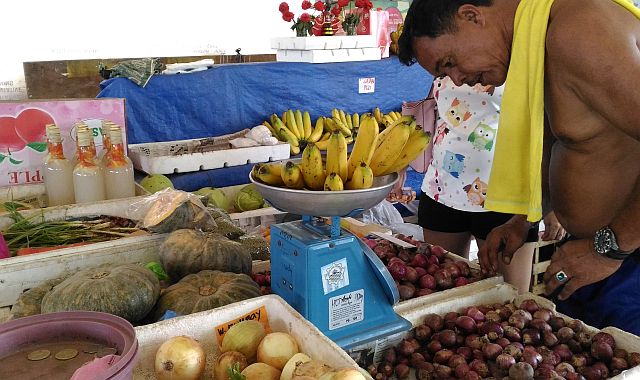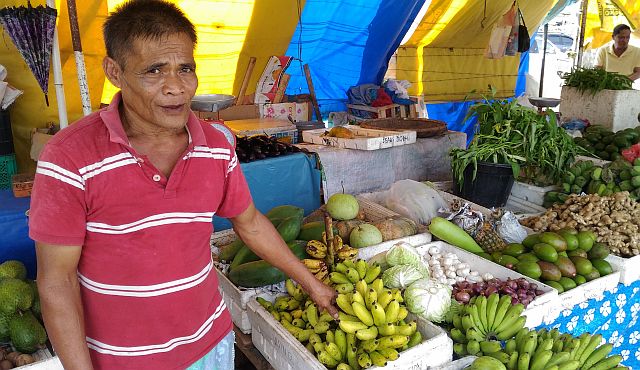
Who’s the prettiest of them all? It is hard to tell, based on physical appearance alone, whether a vegetable is safe to eat. It pays to know the source of fresh produce. (PHOTO/ FRAULINE SINSON)
You go to the market to buy vegetables and you come across two eggplants: a smooth and pretty-looking one and another with pockmarks on its skin.
Which one would you buy? Instinct usually tells you to grab the nice-looking one.
But according to Juanito Redelosa, a 61-year-old farmer from Barangay Sirao, Cebu City, some shoppers prefer to buy the disfigured eggplant because the presence of a worm inside it means less pesticide was sprayed on the vegetable.
Does that mean people should buy only ugly vegetables? No.
Warwin Anadia, Cebu City agricultural technologist, says there are many factors to consider when it comes to vegetable beauty. He cites for example that vegetables can be pretty without or with minimal pesticides if the farmer took care of his crops well. On the other hand, ugly vegetables can also result from lack of proper care.
“It really depends on the management. Then there’s also the saying, wala’y safe nga pagkaon unless ikaw ang nagtanom, which is medyo pinilosopo na siya (there is no safe food unless you were the one who grew it, which is a rather saucy saying),” Anadia said.
Too pretty
Sherefel Rosalejos, a 33-year-old manager of an organic farm in the village of Maloray in Cebu’s southern town of Dalaguete, usually thinks twice when a vegetable is too pretty when she doesn’t know where it came from.
“Heavy application of chemical pesticides and synthetic fertilizers are still the current practice of some conventional farmers,” Rosalejos says. “Some farmers do not even eat their own crops because they know very well the amount of chemicals that they have sprayed on their vegetables.”
Conventional farming is characterized by the use of synthetic chemical fertilizers, pesticides, herbicides, genetically modified organisms, etc.
Advocates of organic farming, which is at the opposite end of the spectrum, believe the consumption of food produced by conventional farming is not good for the body because it can cause diseases such as cancer.
Redelosa, who comes from a mountain barangay in Cebu City, admits that up until he was in his mid-50s, he was one of these conventional farmers who are a bit heavy-handed when it comes to using chemicals. Two years ago, he joined the Sirao Farmers’ Association and has since then attended trainings on Good Agricultural Practices (GAP).
Redelosa says he has heard about some farmers dipping their vegetables such as ampalaya (bitter gourd) in a pail of chemicals just a few days before harvesting to make them look firm and pretty but this is something that he never did. He didn’t want to take the chance of his family eating the chemically treated vegetables. “Mahilo unya akong kaliwat (My family might get sick).”

Nazareno Coca, 63, checks the weight of the bananas his customer wants to buy. He is a farmer from Brgy. Adlaon. He says he lets his common sense guide his farming practices. (PHOTO/ FRAULINE SINSON)
Nazareno Coca, a 63-year-old conventional farmer in Barangay Adlaon, Cebu City, uses chemical pesticides but says he always follows their proper use including the observation of pre-harvest interval. “We eat what we harvest,” says Coca in Cebuano.
James Aguilar, head field consultant for the Dalaguete Vegetable Growers Association (Davega), says he has talked to a lot of conventional farmers and some of them had admitted to using pesticides way more than they should have. This 32-year-old farmer and his group are actively working to get more conventional farmers to observe responsible farming where not only food safety is prioritized but also the protection of the environment.
Don Traje, agriculture coordinator for OURFood Project who works closely with Davega, says the group has been audited by the Bureau of Agriculture and Fisheries Standards (BAFS) and the Department of Agriculture in Central Visayas (DA-7) and has shown evidence that they produce safe food and environmentally friendly vegetable products.
Maximum residue level
Bert Castillo, chief agriculturist at the Integrated Laboratories Division of DA-7, relates there are a few cases every year where samples of some vegetables exceed the maximum residue levels (MRL). An MRL is the highest level of a pesticide residue that is legally tolerated on food.
“We see these MRLs usually on bell pepper and sometimes cabbage,” says Castillo. However, he cannot provide details of these MRLs because these reports are under the Bureau of Plant and Industry.
The Satellite Pesticide Analytical Laboratory of Cebu (SPAL-Cebu), which is under the Plant and Product Safety Service Division of the Bureau of Plant Industry, performs pesticide residue analysis. “Our main function is the monitoring of pesticide residues in agricultural products,” says Bernadette A. Ibarra, chief of SPAL-Cebu.
Ibarra relates that they conduct sampling every week of various crops and they prioritize the monitoring of tomatoes, ampalaya, pechay, eggplant, and bell (sweet) pepper. These are the most common and sellable produce, and they are also the vegetables identified as most exposed to pesticides.

Juanito Redelosa, a 61-year-old farmer from Brgy. Sirao, abandoned the excessive use of chemical pesticides after decades of exposure left his body weak, prone to fainting and chest pains. He is doing his best to adhere to good agricultural practices (GAP). (PHOTO/ FRAULINE SINSON)
With the implementation of the Food Safety Act in February 2015, Ibarra says they are now collecting even more samples and intensifying their monitoring efforts. The results of their analysis are given to the local government units (LGUs) where the sampling was conducted.
Anadia says that so far this year, in Cebu City, they have not received a report alerting them that vegetables randomly sampled at the Carbon Market exceeded the maximum residue levels. When they do get an alert, Anadia says they conduct an information campaign on good agricultural practices.
“Since it is random sampling, we cannot trace where that vegetable came from especially since Carbon market is the center. Vegetables from all over the city, the province and even neighboring islands are brought there by farmers and middlemen,” Anadia adds.
Good agricultural practices
Because beautiful vegetables attract shoppers, farmers sometimes do everything they can to ensure their crops can win the “beauty contest.” They want to avoid a loss at all costs. After all, it only takes one bad harvest for farmers to fall back into a vicious debt cycle.
According to Castillo, farmers don’t have to rely on chemical pesticides to ensure their vegetables will not be attacked by pests as there are other safer alternatives. The government, private sector and nongovernment organizations have been teaching farmers about safer pest management under the GAP through various seminars and trainings. (To be continued…)
Disclaimer: The comments uploaded on this site do not necessarily represent or reflect the views of management and owner of Cebudailynews. We reserve the right to exclude comments that we deem to be inconsistent with our editorial standards.




